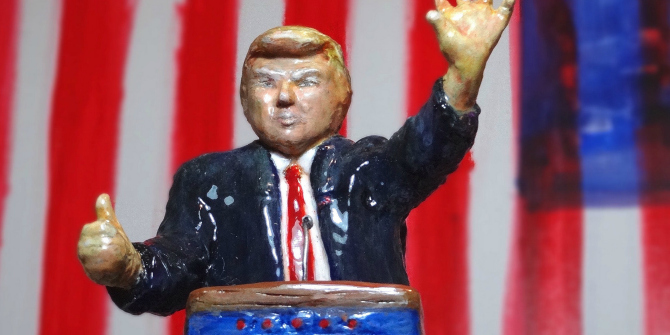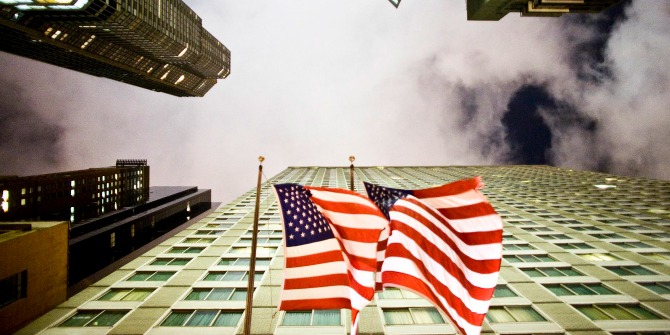 In his final post on the aftermath of the 2016 election, Walter Dean Burnham looks at where the Trump administration and its allies might be leading the US. Looking to history to analyze the present, he writes that the American political universe is based on a liberal individualist tradition, which led to a depoliticization of left-wing voters by the 1960s. This in turn allowed the Republican Party to shift the political spectrum to the right in the 1980s and beyond, a shift which eventually led to the rise of Donald Trump.
In his final post on the aftermath of the 2016 election, Walter Dean Burnham looks at where the Trump administration and its allies might be leading the US. Looking to history to analyze the present, he writes that the American political universe is based on a liberal individualist tradition, which led to a depoliticization of left-wing voters by the 1960s. This in turn allowed the Republican Party to shift the political spectrum to the right in the 1980s and beyond, a shift which eventually led to the rise of Donald Trump.
This is my final article about the wretched 2016 election and its aftermath. Here I will surmise about where decisions already made by the winners seem to be leading the country. But, as always, a survey of the historical background may provide some clues, particularly when readers of my earlier contributions to this blog consult them too.
Some deep background
We start with two of Karl Marx’s more penetrating insights of a century and a half ago.
Capitalism as a system for reorganizing socioeconomic structure is inherently and ferociously revolutionary. Its impact, as it evolves, is explosively and persistently disruptive of any existing states of affairs. Crises in society regularly recur as a consequence.
“Men make their own history, but they do not make it under circumstances directly encountered, given and transmitted from the past. The tradition of all the dead generations weighs like a nightmare on the brain of the living” (“The 18th Brumaire of Louis Bonaparte,” (1852), p. 1). Or, as the Mississippi writer comments, “The Past is not over. Hell, it’s not even past.” Of all white Americans, Southern descendants of the 1861-1865 Confederacy would recognize Faulkner’s point right away.
What distinguishes the American political culture from all others? Half a century ago, Louis Hartz penned a seminal analysis, The Liberal Tradition in America (1955). The comparative point he makes is that “The American way of life” is embedded in the philosophy developed by John Locke’s (1632-1704) Second Treatise of Government (1690). Terms for this phenomenon vary: “Lockian Liberalism,” “Proprietarian individualism,” and so forth. The vital point is that this bundle of ideas is hegemonic in the US, and is a foundation for the common belief in American exceptionalism.
My model of the foundation of the American political universe – critical elections, “stable” phases (so-called) and the heavily class-based decline in turnouts – is based on this “single tradition” of Lockian liberalism. In other nations, capitalist industrialization had spawned the political organization of working-class voters and intellectuals into modern social democratic/socialist/labourite parties.
In the United States, the absence of such a development created numerous and conflicting social strata, each competing for the minimal benefits offered by corporate capitalism. Thus, the forms of democratic procedure survived only at the expense of depoliticizing the great mass of potential left-wing voters. By the late 1960s, the war of powerless strata against other powerless strata only furthered the drift toward forthright authoritarianism: politicization this late in history only leads to dual and equally undemocratic alternatives. Mainstream political science scholars had always stressed the existence and significance of “democratic reform publics” as essential supports for the continuation of liberal democracy. Such publics largely passed from the scene in the 1970s.

Jumps to the right and the politics of disintegration
Since the election of Ronald Reagan in 1980, a series of stepwise “jumps” have shifted the political spectrum rightwards: in 1994, 2000 and (especially) in 2010, reinforced in 2014 and 2016, with the election of Donald Trump and Republican control in most other parts of government, from state legislatures to US Senators and the House of Representatives. Another factor has been the evolution of the Republican Party as an ever-more ideology of right-wing extremism.
Two other developments reinforced the politics of disintegration:
- The Great Economic Crash/Recession of 2008-2011, the adverse effects of which lingered for long afterwards for millions of workers and their families. This, of course, was an “impossible” trauma, according to the canons of “neo-orthodox” economists.
- The election of 2008, and re-election in 2012 of Barrack Obama, the first African-American to win the presidency.
The first sign of trouble was the Tea Party movement in 2009. Perhaps the second was the election in January 2010 of Republican Scott Brown to fill the Senate vacancy created by the long-time “Lion of the Senate,” Ted Kennedy (D. Mass). Then came the Republican landslide of 2010, when Democrats lost (among other things) 63 House seats. Their worst showing since 1946.
For reasons discussed in my earlier articles, a huge, developing general crisis of legitimacy now manifested itself, and thus a vast political vacuum appeared in the clienteles of both parties. And the “rest is history,” as the saying goes.
With the federal government now in an intensely polarized stalemate state, what next? You cannot get there from here. In American politics, the basis for a collective energizing left consciousness and will does not exist in this country. But you can if you are headed to the Right, at least when the established order is in crisis and when there is wide agreement that what is needed is not tinkering but revitalization. Now, enter Donald Trump and his deeply reactionary image as a leader of a movement to roll back the wheel of history.
Featured image credit: Momma Loves The Donald (Flickr, Public Domain)
Please read our comments policy before commenting.
Note: This article gives the views of the author, and not the position of USApp– American Politics and Policy, nor of the London School of Economics.
Shortened URL for this post: http://bit.ly/2itAMbW
______________________
 Walter Dean Burnham – University of Texas at Austin
Walter Dean Burnham – University of Texas at Austin
Walter Dean Burnham is Professor Emeritus at the Department of Government at the University of Texas at Austin. Professor Burnham is best known for his work on the dynamics of American politics (particularly electoral politics). His chief areas of concentration have been on the causes, characteristics and consequences of critical realignments in American history, and the modern-day decay of partisan linkages between rulers and ruled. Much of his recent work has also concentrated on the “turnout problem” and its relationship to other elements of change in American politics. Before coming to Texas in 1988, he was Ruth and Arthur Sloan Professor of Political Science at Massachusetts Institute of Technology.







All across America the black vote “boycott” mastermind by Todd Elliott Koger effectuated an insurmountable obstruction for Hillary Clinton and the Democrats. There is correspondence to the Trump campaign that outlined “Koger’s Plan.” The “Thank you for the suggestion” reply. And, President-Elect Donald Trump’s verbatim use of Todd Elliott Koger’s exact same words during “online videos” and speeches that followed in Michigan, Milwaukee (Wisconsin) and Pennsylvania. Mr. Koger’s writings at one point specifically advised that the “Koger Plan” to target the black vote will changed the destructive conversation and slip in the polls that the “verbal fight” with Khizr Khan, a slain U.S. soldier’s father had caused in late August 2016.
When the Trump campaign started to collapse in October 2016, Mr. Koger suggested the “need for a writing” to change the conversation again. He suggested that the campaign needed to move away from the “hot mic incident.” Todd Elliott Koger’s correspondence suggested a “Treaty with Black America.” There’s another “thank you” from the campaign. And, Mr. Trump almost immediately announced a “Contract with America” and a “New Deal for Black America.”
Maybe this is just a remarkable concurrence of events. Maybe Mr. Koger’s packaging of Mr. Trump’s visual optics and his efforts to communicate implementation of the ” Koger Plan” had no apparent connection. Maybe it was just “serendipity” in North and West Philadelphia (Eastern Pennsylvania) and Penn Hills, Allegheny County (Western Pennsylvania) where turnout fell 10 percent in the majority-black wards. Happenstance in Milwaukee, Wisconsin (District 15), where turnout was down 19.5 percent. And, “a fluke” in Detroit, Wayne County, Michigan, where 75,000 “Motown Voters” stayed home. One thing for sure, Todd Elliott Koger’s correspondence kept reiterating that “Mr. Trump’s only path to victory” was the “black vote.” Cities like Boston, Massachusetts’ “predominately black” wards had their greatest decline in voter turnout this century.
And, just 50,000 votes in three states, Pennsylvania, Michigan, and Wisconsin (the focus of “Koger’s Plan”) decided the election. The National Diversity Coalition for Trump did send another “Thank You.” But interestingly, Todd Elliott Koger and his wife don’t even have tickets for the Trump inauguration, its events, nor any job offers . . . .